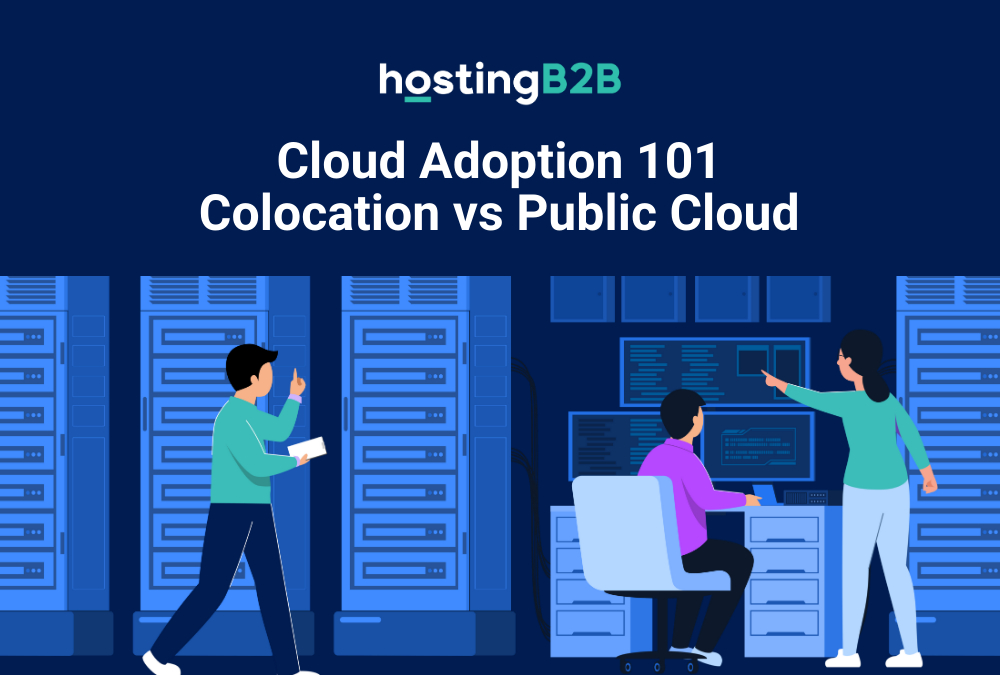Cloud Adoption 101 – Why use Colocation instead of Public Cloud

Why use Colocation instead of Public Cloud
Cloud services are becoming more and more popular around the world today, a very large proportion of businesses choose to host their equipment and services within their Data Center.
For a portion of individuals and/or businesses, it is a matter of security. They do not trust the discretion of their data but for another percentage of individuals and/or businesses.
The lack of know-how and the heavy workload puts the latter category low on the daily agenda.
1. Infrastructure
Data centers are configured with specific features and standards to preserve the needs of today’s high technology.
Some of these features are the constant air conditioning temperature (HVAC) at 21-24 °C, generators and also UPS to guarantee Tier-3 constant electricity flow even in emergencies,
Closed-circuit safety systems and also controlled access doors for further security.
These services are monitored 24/7 by professionals from the Network Operations Center (NOC). Businesses can take advantage of these ideal conditions to keep their equipment at a fairly low cost rather than spending several thousand on these standards.
2. Disaster Recovery
Many businesses around the world use data centers for back-ups and off-site backups, which reduces risk but also promotes business readiness techniques in cases of risk (business continuity, disaster recovery).
For some companies in the Forex, Betting and Banking industry, the competent authorities require companies that are lenders to submit a Disaster Recovery Plan.
3. Redundancy
Data centers are built with strict TIER 3 standards to provide the availability of the N + 1 service so that even when a service such as electricity, air conditioning, a network is in trouble, there is an alternative supply to preserve the proper functioning of the service. In office spaces, this service costs a lot but also, sometimes because of infrastructure, is not feasible.
4. Network
The needs of each business are different and presumably require a fast enough network that, depending on your company’s location, may not be available. Also, if you need 2 providers for redundancy, the cost is raised significantly. In data centers, you can take advantage of the infrastructure to get up to 10Gbps from alternative sources at very attractive rates.
5. Security
Data centers are by nature designed to be secure based on the international certifications of the building. Their purpose is to protect equipment worth millions and have many security features installed during the design process.
They also feature biometric and security cards to control entry to specific spaces, security cameras that record on a 24 hour basis, security guards for entry and exit, and data logging to ensure maximum security against malicious actions, as well as Immediate action can be taken in the event of an emergency on the basis of the international certifications of the building.
6. Certifications
Several companies prefer to have their equipment within the corporate premises but, in order to be successful and effective, they should take the necessary steps to preserve the data of their customers.
In the case of an audit, they should ensure and, by extension, demonstrate that they hold and meet these criteria. On the other hand, data centers are certified with certificates such as PCI DCIS and ISO27001. It is a fact that hosting in data centers will save both manpower and money as, among other things, certification can cost a few thousand euros per year.
7. Cost
Creating a smaller data center for your needs may be more costly than hosting equipment at a local data center. The cost of infrastructure and maintenance combined with certifications requires large amounts of a company’s budget.
It is also difficult to predict the risk for the amount of money to be spent in case of storage of equipment in an unreliable location (Electricity and ground voltage regulator, firefighting, anti-seismic infrastructure, etc.).
8. Support / Experience
24/7 support is provided in the hosting environment. Also, our data centers are staffed 24 hours a day by our engineers, enabling you to take action in time, without having to employ staff for these extra hours. Besides, when a business hosts its equipment in local data centers, these grow and are able to manage more staff in all areas to properly service and resolve all types of problems that may arise.
Even when a company does not pay for Support, it can for any event, hire professionals to successfully complete a job with a high degree of difficulty (Managed Services).
Our support is available free of charge = Click Here For Support
9. Expandability
Designing and building a Data Center is costly and time-consuming. When in case your business is needs larger infrastructure to support more customers, how far can you go? In case you just need a little more room or more speed, data centers can make these changes in less than 24 hours.
This allows each business not to worry about designing additional infrastructure to support a product or service they offer.
10. Maintenance cost
It is true that maintenance costs in data centers are inevitable. The infrastructure should be maintained weekly and monthly. UPS batteries should be replaced at regular intervals, as well as generators. Regular need exercises and fuel to maintain an autonomous infrastructure.
By hosting the equipment, you can save enough money. Increase your customer base and upgrade your equipment with new servers, SAN Storage, Firewalls, and more.
Visit Our website (www.hostingb2b.com) and talk to a consultant for more information about Data Center Colocation services.

Request Consultation
Article Published By George Sarris
Creative and strategic thinking IT executive with demonstrated experience in iGaming companies since 2010 in Cyprus, Malta and UK.
Expertise covers the following areas:
– Managing DataCenters
– Lead NOC teams
– Engineering of High-Scale Systems
– System Architecture
– Drafting of Technical & Software Documentations as per ISO 27001
– Startups
Recommended Posts

The Importance of Regular Website Backups
July 18, 2024




